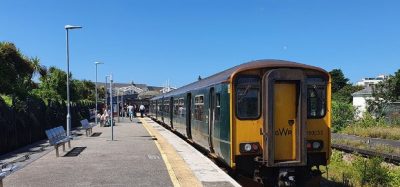Italo – now a reality
Posted: 1 August 2012 | | No comments yet
On 28 April 2012, the first passenger-filled Italo train left Naples station heading to Rome, Florence, Bologna and Milan. It was a highly emotional moment for everybody at NTV: the personnel, the partners and, of course, for me. After approximately four years of startup plans, the project finally became a reality.
It was also a historical moment for the Italian railway sector. For the first time, thanks to NTV, passengers now have the option to choose between operators. When a monopoly comes to an end – no matter in which field – it’s always a revolution for the market and an advantage for the public.
Tests and simulations are over, and now we face the market as any private company must do. A group of Italian entrepreneurs has invested €1 billion in this project – a huge amount of capital that has never been seen before in Europe by the private railway sector. Further – more, the current situation in Italy will provide a crucial reference point for liberalisa tion and competition across the Continent. If we prove successful, newcomers in other countries may try to take the same path. So it comes with no surprise that we are being observed with great attention by many large railway operators.
On 28 April 2012, the first passenger-filled Italo train left Naples station heading to Rome, Florence, Bologna and Milan. It was a highly emotional moment for everybody at NTV: the personnel, the partners and, of course, for me. After approximately four years of startup plans, the project finally became a reality. It was also a historical moment for the Italian railway sector. For the first time, thanks to NTV, passengers now have the option to choose between operators. When a monopoly comes to an end – no matter in which field – it’s always a revolution for the market and an advantage for the public. Tests and simulations are over, and now we face the market as any private company must do. A group of Italian entrepreneurs has invested €1 billion in this project – a huge amount of capital that has never been seen before in Europe by the private railway sector. Further - more, the current situation in Italy will provide a crucial reference point for liberalisa tion and competition across the Continent. If we prove successful, newcomers in other countries may try to take the same path. So it comes with no surprise that we are being observed with great attention by many large railway operators.
On 28 April 2012, the first passenger-filled Italo train left Naples station heading to Rome, Florence, Bologna and Milan. It was a highly emotional moment for everybody at NTV: the personnel, the partners and, of course, for me. After approximately four years of startup plans, the project finally became a reality.
It was also a historical moment for the Italian railway sector. For the first time, thanks to NTV, passengers now have the option to choose between operators. When a monopoly comes to an end – no matter in which field – it’s always a revolution for the market and an advantage for the public.
Tests and simulations are over, and now we face the market as any private company must do. A group of Italian entrepreneurs has invested €1 billion in this project – a huge amount of capital that has never been seen before in Europe by the private railway sector. Further – more, the current situation in Italy will provide a crucial reference point for liberalisa tion and competition across the Continent. If we prove successful, newcomers in other countries may try to take the same path. So it comes with no surprise that we are being observed with great attention by many large railway operators.
Focus on passenger comfort
As newcomers, innovation is crucial for us. From the beginning, we studied and researched a unique approach and our aim is to provide a railway transportation system that offers a high level of hospitality that is typical of other sectors, like hotels or cruise ships. In other words, we wanted to put the passenger at the heart of the project.
Obviously, the train itself is a very important part of our strategy, and we believe Italo is the most modern in Europe in terms of technology, comfort and its environmental benefits. Conceived for a commercial speed of 360km/h, the Italo is not only incredibly fast but very comfortable too. The journey is smooth as no vibrations can be felt or track-noises heard on board, while large windows allow more light to enter the carriages and also provide a better view of the Italian landscape. There is more space for passengers too, as wide carriages give increased legroom, and to maximise comfort, all seats are leather, ergonomically designed and can be reclined.
Creating a series of ambiences
A key element of our commercial offer is that Italo is a train for every kind of passenger: tourists, students, families, businessmen, etc., and not just an exclusive product. Therefore, we have three different ambiances/classes that allow passengers to choose different levels of service.
With big, comfortable leather seats and free Wi-Fi (found in the entire train) the ‘Smart’ class offers the lowest fares and a no-frills service. The ‘Prima’ class guarantees all-round comfort in an elegant environment: everything is designed to allow for a relaxing journey, including a welcome service and daily papers for passengers. The ‘Club’ class is the exclusive area for the most demanding passengers who require maximum comfort, discretion and a custom-tailored service, plus even more space. The Club car is located at the end of the train to guarantee a quiet environment with a constant personal service. The range of service options is completed by the ‘Prima Relax’ class, where loud noises and telephone ringtones are forbidden, and a ‘Smart Cinema’ car designed as a 39-seat movie theatre with high-definition screens positioned on the ceiling.
Passenger feedback
At the end of the day, it is up to passengers to decide whether we provide a good product or not, and the first set of feedback from the market is positive. In the first two months of service we transported roughly 170,000 passengers, with a load factor around 46% – higher than our initial forecast. Our punctuality rate of approximately 95% is very good too. On the other hand, it’s still too early to draw any definitive conclusion. For now we can only compare the Italo to a new born baby – it is growing well and we are confident in its future. It is now up to us to continually improve our service and correct mistakes that may occur.
A professional service
Punctuality and passenger number data is vital for us, but not everything revolves around statistics. The biggest satisfaction for us is to receive sincere compliments from the pass – engers of our new service: they certainly like the train, but what impresses me the most is how often I’m told by passengers is that they have particularly appreciated the professionalism and courtesy of our personnel. This means we have done a good job to select and carefully train the right people to represent our service. NTV has already created nearly 1,000 jobs and we expect this number will grow to over 1,100 (plus at least another 1,000 in the outsourced service). We chose to employ very young people (for many of them this is their first job experience) and as such, we have been rewarded by their enthusiasm.
The competition has arrived
The end of a monopoly and the arrival of competition is a positive revolution because it produces an immediate effect on the market and tangible benefits for the passengers and the transportation system as a whole: prices go down while quality of the service tends to rise. Since we announced the birth of NTV, and even more intensively since we stepped into the market, the state owned railway operator has tremendously improved its service and it has refurbished part of its fleet. We conceived an innovative fare scheme, based on transparency and clear prices. Trenitalia and Alitalia, the other main competitor, immediately followed us on this path.
But without clear and fair rules for all, competition alone cannot produce effective and long-term advantages. Recently, the Italian government finally decided to create an Authority for the transportation sector, but this regulatory body is not yet operative. An independent monitoring function is crucial to level the playing field since the state owned operator belongs to the same holding that controls the infrastructure manager. We are in favour of generating a separate appeal body to effectively handle any complaints between competitors.
Growing the service
We are confident that we will overcome any hurdles and we are focused on the future. Italo trains are already running on the Naples– Rome–Florence–Bologna–Milan line and before year end the network will expand to Salerno (south of Naples and gateway to the beautiful Amalfi coast), Padua, Venice and Turin, when our 25-strong train fleet will be fully delivered and offer 50 trips a day. Once we are consolidated, we would also like to move into the Italian regional transportation marketplace, where there is space for quality improvement. We will certainly participate in tenders for this marketplace.
We are only at the beginning and we are aware that we need to listen to our passengers’ advice or criticism to further develop our service. We have an excellent product, but fine tuning in some areas is needed, and we are working hard on it. After all, a new born baby needs constant care.
About the author
Giuseppe Sciarrone has accumulated noteworthy experience in the field of transportation, especially in the management of major transportation enterprises, the management of firms engaged in the design of transportation systems on a European level and the management of public structures for the planning of transportation. Giuseppe is a founding shareholder of NTV which was established in December 2006.






